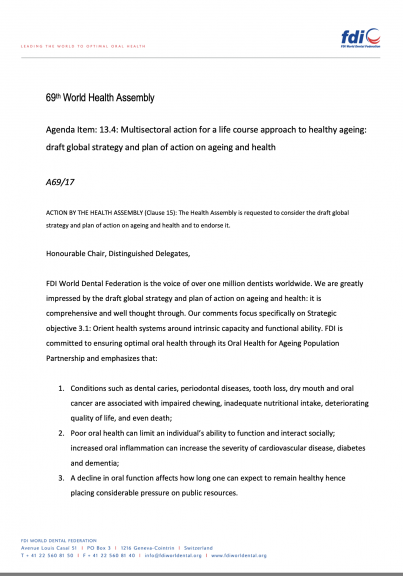
WHA69 - Multisectoral action for a life course approach to healthy ageing
Agenda Item 13.4:
Multisectoral action for a life course approach to healthy ageing: draft global strategy and plan of action on ageing and health
A69/17
ACTION BY THE HEALTH ASSEMBLY (Clause 15): The Health Assembly is requested to consider the draft global strategy and plan of action on ageing and health and to endorse it.
Honourable Chair, Distinguished Delegates,
FDI World Dental Federation is the voice of over one million dentists worldwide. We are greatly impressed by the draft global strategy and plan of action on ageing and health: it is comprehensive and well thought through. Our comments focus specifically on Strategic objective 3.1: Orient health systems around intrinsic capacity and functional ability. FDI is committed to ensuring optimal oral health through its Oral Health for Ageing Population Partnership and emphasizes that:
- Conditions such as dental caries, periodontal diseases, tooth loss, dry mouth and oral cancer are associated with impaired chewing, inadequate nutritional intake, deteriorating quality of life, and even death;
- Poor oral health can limit an individual’s ability to function and interact socially; increased oral inflammation can increase the severity of cardiovascular disease, diabetes and dementia;
- A decline in oral function affects how long one can expect to remain healthy hence placing considerable pressure on public resources.
We believe that specific plans of action by member states, the WHO secretariat and international and national partners, in our case National Dental Associations, should include measures to:
- Jointly promote oral health throughout life and especially in later life;
- Address an increased need for oral health services for dentate older adults, in response to a decline in complete tooth loss. These include preventive and restorative services throughout the life course;
- Monitor and periodically report oral health measures and related health factors, using standardized epidemiological surveillance. They should support public health policies for healthy ageing;
- Support and commit to scientific research on the interrelation of NCDs with oral diseases and their impact on general health, well-being and quality of life;
- Provide training and education to the dental workforce, at all levels, to meet the increasing needs of the elderly.
